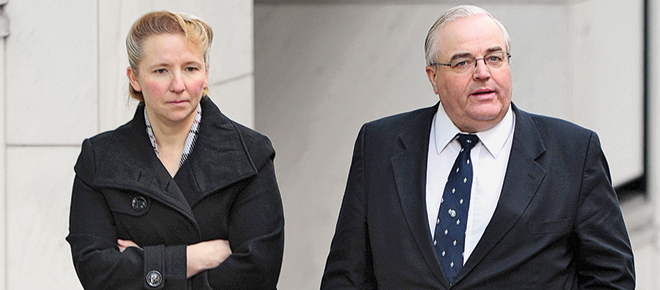When a polygamist cheats
The Canada Revenue Agency succeeds where the police and province failed against Winston Blackmore
Nick Procaylo / PNG
Share

These are trying times for Winston Blackmore, the once all-powerful bishop of Bountiful, B.C., and for his 120-plus children, his 21—no, make that 22—“celestial” wives (a fellow can be forgiven for losing count) and the remaining 400 or so members of his diminished flock. In a court ruling released last week, the Canada Revenue Agency succeeded in doing what the combined forces of the RCMP, special prosecutors and successive attorneys general of British Columbia have so far failed to do over many decades—it held Blackmore to account.
For years the courts and the Charter of Rights and Freedom have been his shield and sword, protecting him and others in the sect from criminal convictions for their practice of polygamy and from disturbing allegations of forced underage marriage of girls and sexual exploitation of minors. Prosecutors have said polygamy charges might not survive a freedom-of-religion challenge, and the girls and women of Bountiful have been loath to co-operate with police. But successive court cases have exacted a cost, both financial and in the unwelcome attention focused on the lives and Byzantine business dealings of Blackmore and his secretive flock.
In a Tax Court of Canada ruling, Justice Diane Campbell rejected Blackmore’s claims that the fundamentalist Mormon community of Bountiful, or at least the portion recognizing his leadership, constitutes a communal religious organization eligible for tax exemption. The ruling rejects the 57-year-old Blackmore’s appeals for six taxation years beginning in 2000, leaving him with a bill for taxes owed on $1.8 million in undeclared income, a penalty of almost $150,000 for hiding an “astronomical” amount of income and a still undetermined sum of court costs.
This wasn’t your typical tax case. “These appeals introduced unique and novel legal and factual issues,” Campbell wrote with judicial understatement. Campbell acquainted herself with the intricacies of Mormonism, Episcopal polity and such terms as priesthood work, she wrote. She ultimately concluded that members of Bountiful, the sect’s name for Lister and other scattered communities, in southeastern B.C., “are not members of any religious organization but are a group of independent Mormon fundamentalists.”
Blackmore, who’s used to having his orders followed, was visibly uncomfortable with the probing questions of the judge and lead federal lawyer—both assertive women. He reluctantly gave details of his family life: that he had 21 wives, revised to 22 when he admitted forgetting one, and that he fathered 47 children during the taxation years in question. He skirted his total number of children, said to exceed 120. “It would be hard to make an accurate list,” he said. “It would take some time to do that.” He described how his family is clustered in several homes, with some in other communities. “We don’t have any facilities big enough for everyone in the community to live under the same roof.” Meals are prepared in a commercial-sized kitchen. Baking, butchering, food and bulk milk storage are handled with industrial equipment and facilities. Meals are taken in a dining room seating 150-200 people. He presides over a Sunday religious service lasting 90 minutes. “I try not to go beyond that,” he said. He’s the arbiter of religious, marital and business affairs, and painted himself as a “liberal” and benevolent leader.
He described the split in 2002 that cut Bountiful into rival camps, with half of the 1,000-plus members following James Oler, who Blackmore said had strayed from the “foundation principles” of Mormonism. “We’re trying to figure out where we all are with the major upheaval in our faith,” he said.
His business affairs are equally complicated, from trucking to farming to logging and fence-post making, much of it run under J.R. Blackmore & Sons, a company he directed. The businesses are so scattered through Alberta, Idaho and several small B.C. centres that Blackmore and one of his brothers shared command of a four-passenger Cessna to track their operations. Children and young males worked for low wages, with much of their pay turned over to Blackmore, prompting a federal lawyer to say: “The role of a good shepherd is to shear the sheep, not skin it.”
Those high-flying days seem to be over. Blackmore cried poor in 2010 in a failed attempt to get government funding to participate in a B.C. Supreme Court reference on Canada’s polygamy law. He listed in an affidavit liabilities of $5.65 million and assets of less than $900,000. (The reference upheld the ban on polygamy, though it said the ban infringes on some sections of the Charter.)
Now Bountiful waits for the other shoe to drop. The province appointed special prosecutor Peter Wilson almost 20 months ago to look at filing criminal charges for alleged sexual offences against minors. If charges are filed, Blackmore and Bountiful will face a test of faith and another costly legal battle. First, though, the cash-strapped Blackmore must serve two masters: the Canada Revenue Agency and the Lord. As Joseph Smith, founder of the Mormon faith, wrote of a revelation from God: “Behold, it is my will that you shall pay all your debts.”